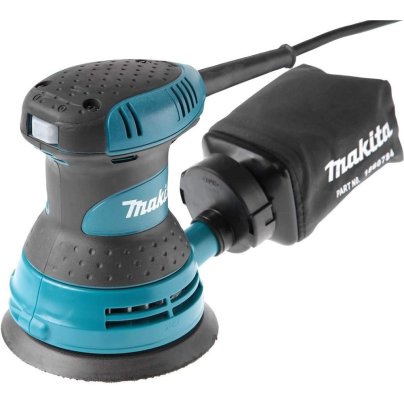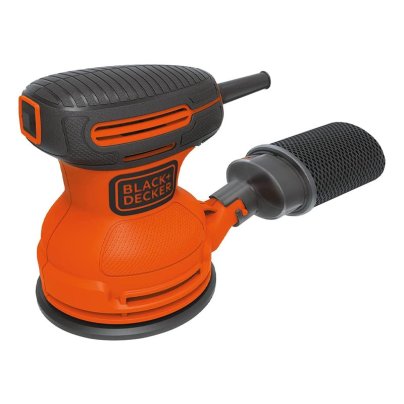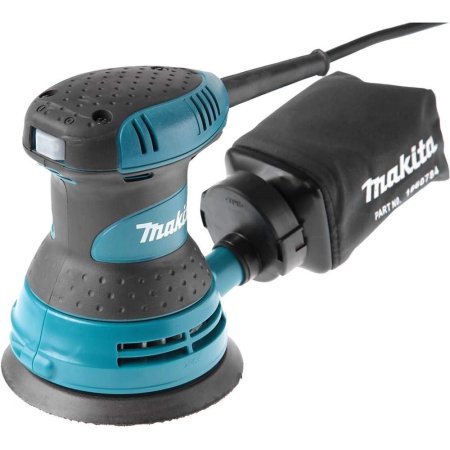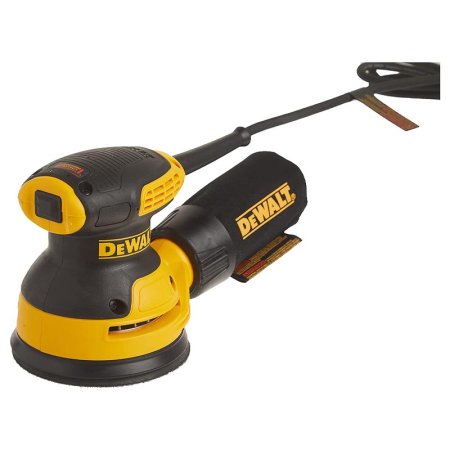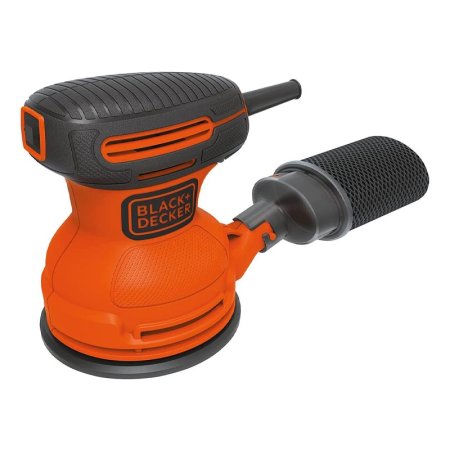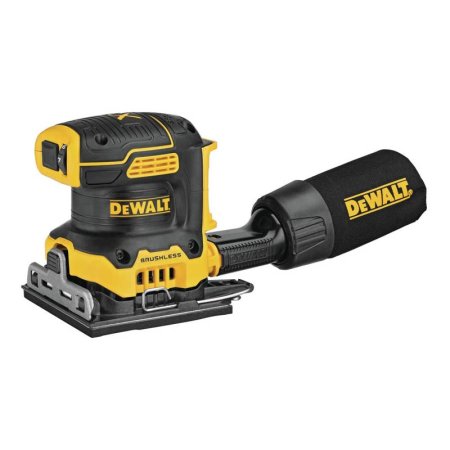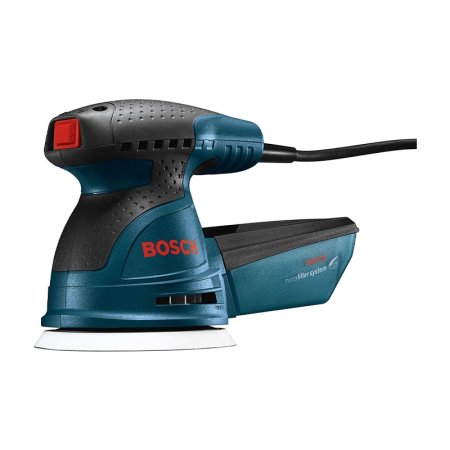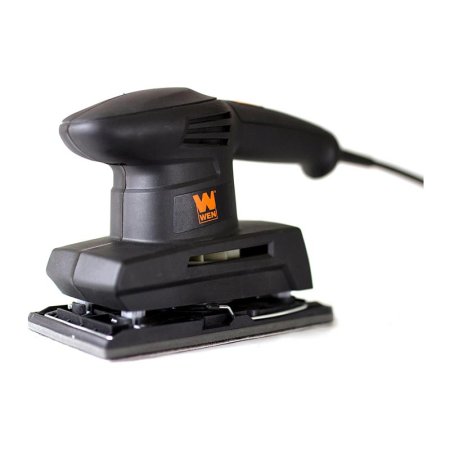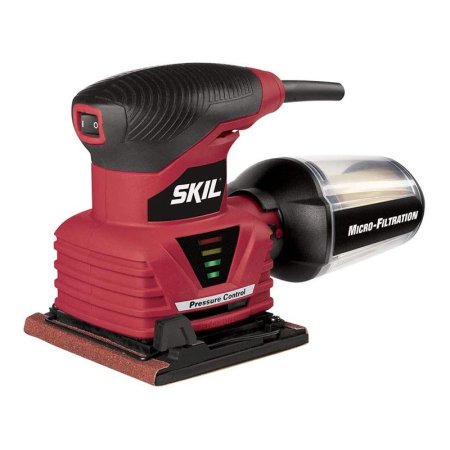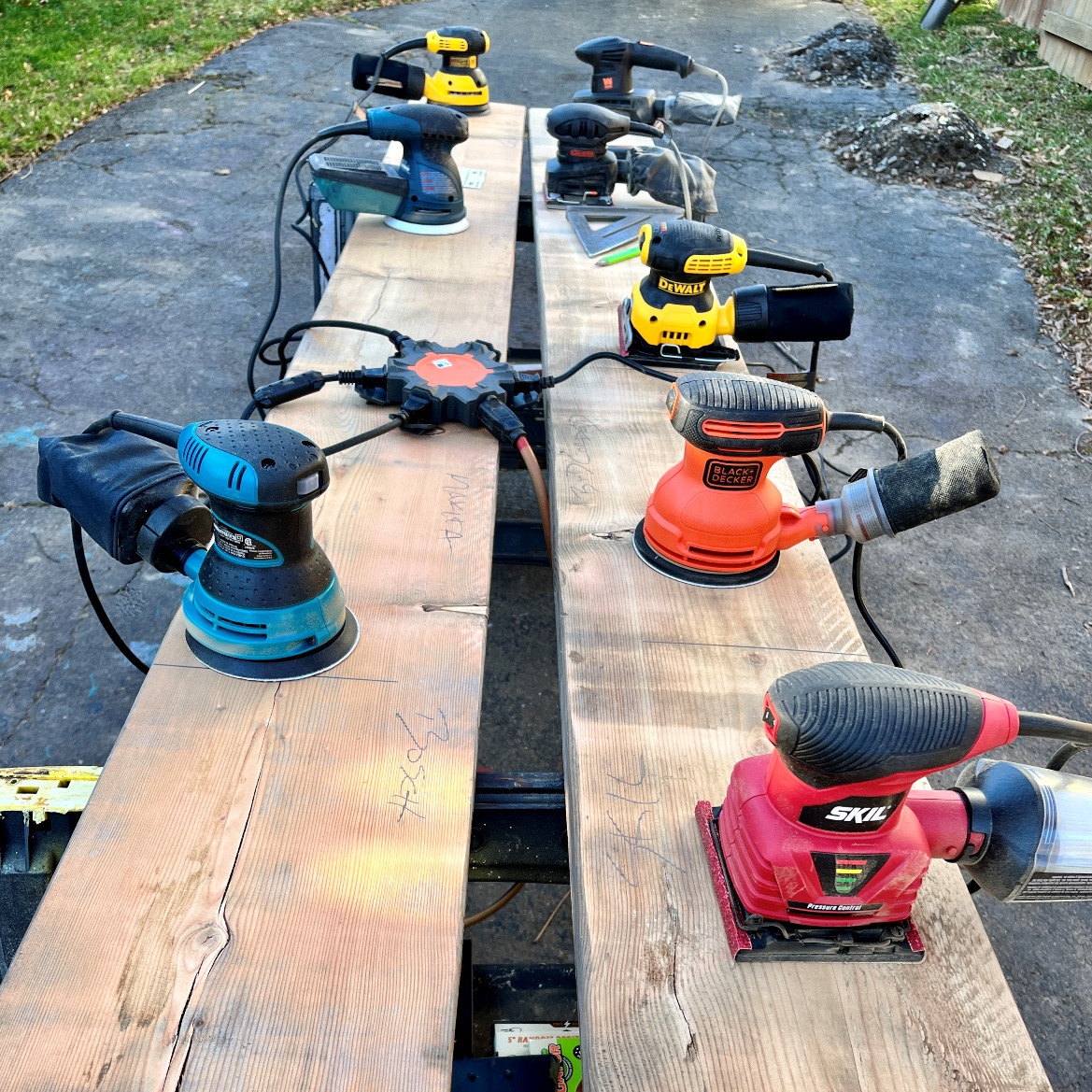
We may earn revenue from the products available on this page and participate in affiliate programs. Learn More ›
The finishing touches on a woodworking project can transform decent work into stunning craftsmanship, and nothing helps simplify the task like a palm sander. Some DIYers spend hours slowly sanding down wood projects by hand to achieve the perfect finish—a method that is undoubtedly rewarding but also time-consuming and tiring. But a palm sander can get you the same results (if not better) in less time. We researched and field-tested some of today’s most popular palm sanders to determine which are worth their salt.
Whether you’re looking to add a premium sander to your woodworking arsenal or just planning on refurbishing some old furniture, a good palm sander can be mighty useful for repair and maintenance around the house. That’s why we aimed to include a variety of different types of sanders to suit various needs. For example, our Best Overall pick, the Makita BO5030K 5-Inch Random Orbit Sander, wowed us with its well-rounded design that makes it a handy tool for all kinds of sanding tasks. Plus, it’s a great value. But we also included more specialized tools. Read on to discover why we think the models we picked are the best palm sanders currently on the market.
- BEST OVERALL: Makita BO5030K 5-Inch Random Orbit Sander
↓ Jump to Review - RUNNER-UP: DeWalt DWE6421 5-Inch Random Orbit Sander
↓ Jump to Review - BEST BANG FOR THE BUCK: Black+Decker BDERO100 5-Inch Random Orbit Sander
↓ Jump to Review - BEST CORDLESS: DeWalt 20V MAX XR Cordless Variable Speed Sander
↓ Jump to Review - MOST COMFORTABLE: Bosch ROS20VSC 5-Inch Palm Random Orbit Sander
↓ Jump to Review - MOST UNIQUE DESIGN: Wen 6313 Electric ⅓-Sheet Sander
↓ Jump to Review - BEST ¼-SHEET SANDER: Skil 7292-02 ¼-Sheet Sander With Pressure Control
↓ Jump to Review - BEST SHEET EXCHANGE: DeWalt DWE6411K ¼-Sheet Palm Grip Sander Kit
↓ Jump to Review
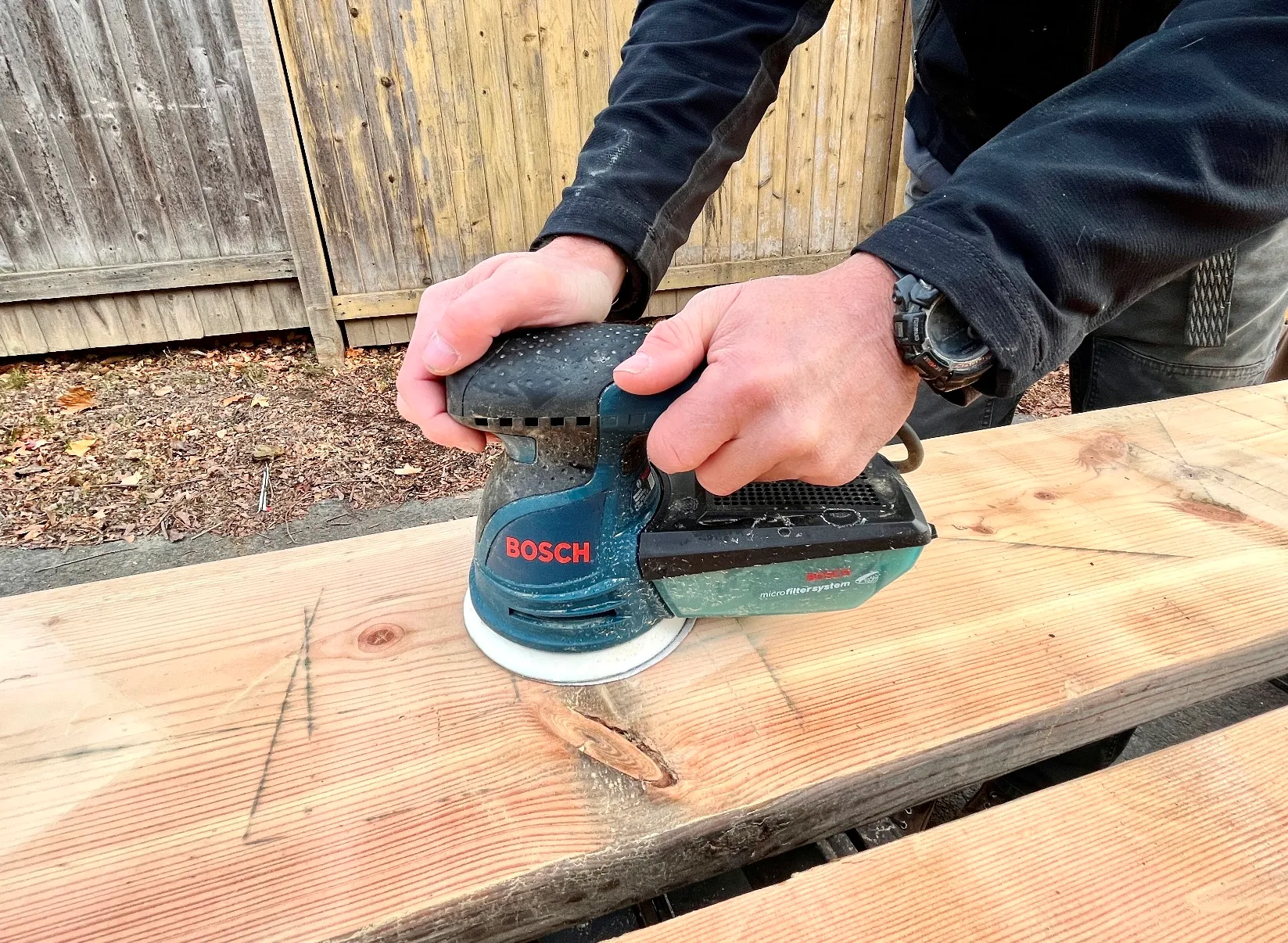
| Testing Stats | |
| Products tested | 8 |
| Time spent testing | 12 hours |
| Tests performed | 4 |
| Price range | $30 to $135 |
Our Top Picks
A sander’s primary function is to prepare a surface for a new finish, such as removing the finish for a wood floor repair or even smoothing a hard-to-sand fast-setting joint compound on drywall. Nonetheless, this collection of top picks includes both sheet sanders and random orbital sanders. We tested all the products below, evaluating them for stock removal, vibration, engagement with the workpiece, and other important features. All these sanders left nice finishes and did their job for stock removal; the differences are in the details.
Best Overall
Makita BO5030K 5-Inch Random Orbit Sander
Product Specs
- Speed: 12,000 orbits per minute (OPM)
- Power: 3 amps
- Cord: Corded
What We Like
- Limited vibration helps user create smooth finishes easily
- Powerful motor capable of handling most sanding tasks
- Quiet operating volume; suitable for home workshops
What We Don’t Like
- Dust bag isn’t ideal for heavy-duty use
Offered at a reasonable price, the Makita random orbit sander combines all the best features found in a tool in its category. During our hands-on testing, we found that it has the power needed for stock removal, and it runs quietly and smoothly. This electric sander pushes enough power into to facilitate stock removal without sending any uncomfortable vibration back to the user’s hand.
The Makita sander’s body is tall and slender, making it easy to use for long jobs, and it has a decent cord length. It ships with a blow molded kit box for easy storage in the shop or on the truck. The dust bag is a little better than average, and the dust containment works well, too.
Get the Makita orbital sander at Amazon, The Home Depot, or Acme Tools.
Runner-Up
DeWalt DWE6421 5-Inch Random Orbit Sander
Product Specs
- Speed: 12,000 OPM
- Power: 3 amps
- Cord: Corded
What We Like
- Counterweight design reduces vibration and minimizes user strain
- Dust bags are easy to empty after use
- Small pommel is ideal for DIYers
What We Don’t Like
- Louder than some competing palm sanders
The DeWalt random orbit sander delivers what’s needed from a sander. During our testing, we found that it removes stock excellently, leaving behind a nice finish to boot. Its counterweight design reduces vibration for smooth operation, which is great for extended jobs.
This sander engages with the workpiece reliably, and it is easy to employ the switch. It’s a compact tool and has a small pommel, which may be an advantage to some users. Held open by a spring, the dust bag is much better than average and easy to dump out. The sander machine is simple and it works well. While it’s a little louder than other top picks, it’s not too loud overall.
What our tester says: “To be honest, I was kind of skeptical about comparing a single-speed random orbital sander to other models with more features and flexibility. However, this model from DeWalt proved more than worthy during testing. First, it felt lighter than the other corded models, and it was quite comfortable in hand thanks to its compact and low-profile design.” —Tom Scalisi, Bob Vila tester and writer
Get the DeWalt 5-inch palm sander at Amazon, The Home Depot, or Ace Hardware.
Best Bang for the Buck
Black+Decker BDERO100 5-Inch Random Orbit Sander
Product Specs
- Speed: 12,000 OPM
- Power: 2 amps
- Cord: Corded
What We Like
- Feature-packed design offers great value
- Large, easy-to-empty dust bag
- Provides a smooth finish
What We Don’t Like
- Lacking power for heavy-duty sanding
The Black+Decker sander is ideal for occasional home-use jobs. The tool removes stock, runs smoothly enough, and won’t break the bank. It’s priced at less than half of some of the more pro-focused tools, and we found that it also runs smoothly.
This sander’s switch is sealed and engages easily. It has a quality dust bag for a budget-friendly tool. It runs smoothly and despite lacking a variable speed configuration and having a lower OPM than others, we found that it can work on rough pieces, open the grain of a piece of stock to accept stain, or even sand a tough drywall repair.
Get the Black+Decker palm sander at Amazon, Lowe’s, or Acme Tools.
Best Cordless
DeWalt 20V MAX XR Cordless Variable Speed Sander
Product Specs
- Speed: 8,000 to 14,000 OPM
- Power: 20 volts
- Cord: Cordless
What We Like
- Cordless design; portable and easy to use
- Variable speed configuration gives user more control
- Easy to change between soft and coarse sandpapers
What We Don’t Like
- Costs more than corded tools
The variable speed control of the DeWalt 20V Max XR cordless palm sander allows it to be set as low as 8,000 OPM for a fine finish or as high as 14,000 OPM when extra power is needed. The cordless hand sander features a brushless motor that increases the life of the tool by decreasing the friction within the motor. The cordless design allows it to be used in the yard, in the workshop, or anywhere around the house without having to worry about dragging around an extension cord. The handy dust collector helps to keep a project clear of debris.
We found that the DeWalt cordless sander’s paper exchange is the best among the sanders we tested, cordless or otherwise. The fact that it runs smoothly, without a cord, and and on par with its corded counterpart makes this a versatile sander. Factor in the nice switch and a variable speed dial on top of that and this DeWalt sander could find a home doing more work than just sanding woodworking projects, including sanding fast-set joint compound in a drywall repair on low-speed or detail sanding a floor repair. Swapping out the battery is easy, and the sander feels nicely balanced.
Get the DeWalt cordless palm sander at Amazon, Lowe’s, or Acme Tools.
Most Comfortable
Bosch ROS20VSC 5-Inch Palm Random Orbit Sander
Product Specs
- Speed: 7,500 and 12,000 OPM
- Power: 2.5 amps
- Cord: Corded
What We Like
- Comfortable compared to similar options
- Variable speed control enhances versatility
- Outstanding dust-container design minimizes mess
What We Don’t Like
- Can be slightly “grabby” when engaging the work
The Bosch random orbit sander delivered on all metrics during our hands-on testing. While it could be a bit grabby every now and again, it’s not enough of a reason to overlook its quiet, smooth, and comfortable operation. Generally speaking, most sanding is two-handed sanding, as one hand helps the other move the tool along the work, sanding out trouble spots. This tool’s larger pommel gives more surface area to fit two hands comfortably, making this tool the easiest for two-handed sanding among all the sanders tested.
The variable speed dial on the rear of the handle enables customizing the OPM to suit the project at hand. The unit performs well across the board, from stock removal to fine finishing. It has a top-notch hard plastic dust container that is easy to install and remove.
What our tester says: “I like the affordable price point, making it a steal (in my opinion). While I did think it felt a bit heavy compared to other cordless models, I liked the comfortable rubber grip and the fact that users could change speeds easily.”—Tom Scalisi, Bob Vila tester and writer
Get the Bosch palm sander at Amazon, The Home Depot, or Acme Tools.
Most Unique Design
Wen 6313 Electric 1/3-Sheet Sander
Product Specs
- Speed: 12,000 OPM
- Power: 1.2 amps
- Cord: Corded
What We Like
- Dual handles minimize vibration and add comfort
- Only peel-and-stick pad in our sheet sanders roundup
- Biggest pad at ⅓-sheet; suitable for large projects
What We Don’t Like
- No hole punch for perforating paper
With a 1.2-amp motor that delivers up to 12,000 OPM, this sander from Wen is powerful enough for tough projects despite weighing in at only 3 pounds. During testing, the corded design and padded grip allowed for long periods of comfortable working time without worrying about running out of power, while the integrated dust-collection bag minimized sawdust and cut down on cleanup time.
This dual-handled, ⅓-sheet tool is also fun to use. While it has a pommel like a typical palm sander and can be used as such, it also has a handle extension like a belt sander. The switch is very easy to engage for “on” or ”off,” it runs reasonably smoothly, and it’s terrific for both one- and two-handed operation. While it has easy-to-use stays for trapping ⅓ sheets of sandpaper, it’s also compatible with hook-and-loop paper. Overall, it provided reliable stock removal, sufficient power, and comfortable operation.
Get the Wen palm sander at Amazon, Lowe’s, The Home Depot, or Walmart.
Best ¼-Sheet Sander
Skil 7292-02 ¼-Sheet Sander With Pressure Control
Product Specs
- Speed: 14,000 OPM
- Power: 2 amps
- Cord: Corded
What We Like
- Dust container minimizes escape of dust and debris
- Powerful compared to similarly priced competitors
- Built-in vacuum adapter helps minimize mess
- Included paper punch for added user-friendliness
What We Don’t Like
- A bit noisy; may disturb others during use
During our hands-on testing, the micro-filtration system captured dust particles while we sanded, keeping the surface of the project clean. With up to 14,000 OPM, the Skil ¼-Sheet Palm Sander is powerful enough for tough projects, while the pressure-control system helps even the most inexperienced DIYer apply the correct amount of pressure for the job. The corded design and padded grip allow for long periods of comfortable working time without the user worrying about running out of power.
The tool doesn’t come with a punch to enable dust to pass into its excellent dust container; the user must punch the paper manually, which isn’t the end of the world. Much better than a typical fabric bag, this hard, see-through plastic case with a filter enables the user to see when the case is full and doesn’t allow much dust to become airborne or spill as with typical bags. It offers impressive stock removal and an easy-to-use switch.
Get the Skil palm sander at Amazon, Lowe’s, or Acme Tools.
Best Sheet Exchange
DeWalt DWE6411K ¼-Sheet Palm Grip Sander Kit
Product Specs
- Speed: 14,000 OPM
- Power: 2.3 amps
- Cord: Corded
What We Like
- Versatile paper exchange compatible with many sandpaper options
- Quiet, smooth operation with minimal vibration
- High-quality dust bag catches debris effectively
What We Don’t Like
- Compact design; some may prefer a larger tool
For sites, shops, or jobs where sandpaper needs to be changed out frequently, DeWalt’s system is far and away the best among those we tested. A simple release in front makes catching the paper super easy, as it quickly traps it in the back with the help of the wire clamps.
With enough power for tough materials, the user can really lean on this tool to handle difficult stock removal. It runs quietly, has a better-than-average dust bag, a built-in vac adapter for hooking directly to a vacuum without transition pieces, an included sheet punch, a strong cord, and it operates smoothly. By design, the tool is compact enough to allow users to work in tight spaces.
Get the DeWalt ¼-sheet palm sander at Amazon, Lowe’s, or The Home Depot.
Jump to Our Top Picks
How We Tested the Best Palm Sanders
We aimed to include a wide array of uses in a single side-by-side power sander test, including everything from bulk stock removal to surface detailing. To do that, we chose to see how the tools performed on a beat-up, weather-stained Hem-Fir 2×10 that had been outside for a few months.
Because we wanted to re-create typical use cases for these sanding tools, we used each sanding machine with three grits of sandpaper: rough (50-grit), medium (80-grit), and fine (120-grit).
- 50-grit sandpaper test: Evaluated stock removal and power in the mill marks and knots on the 2×10.
- 80-grit sandpaper test: Tested further stock removal and how each tool engaged with the piece of material.
- 120-grit sandpaper test: Determined how well each tool polished the material and opened the grain of the wood.
In addition to evaluating each tool’s performance, we assessed the overall user experience. Cord length and flexibility, switches, paper exchange, smoothness, and comfort during use were also important criteria during our hands-on tests.
While sanding projects can look super smooth before finishing, applying a finish can reveal swirl marks or blemishes the naked eye wouldn’t otherwise detect. We applied a finish to the wood to check that the sanded area was completely smooth before applying a finish to the main piece.
What to Consider When Choosing the Best Palm Sander
Selecting the right palm sander depends on the project. Some of the most important considerations include whether the sander is corded or battery-powered, how many orbits per minute it provides, and what dust-collection features it offers.
Corded vs. Battery-Powered
Most power tools now come with these two options for their models: corded and battery-powered. Depending on available space, a corded sander can be effective and efficient, never running out of power or slowing to a lower OPM level than needed. For projects in a basement workshop, a garage, or a shed, corded sanders tend to be the best option. Simply pair them with an extension cord and they can be used in any workshop space that has electricity.
Battery-powered sanders eliminate the need to manage a cord, which can get in the way on a workbench or a work table. A cordless sander can be easily used while outdoors, or indoors where the user is far from accessible outlets. While these sanders can have issues with maintaining a set OPM level if their battery gets low, spare batteries can solve this issue when they are switched at regular intervals. Cordless sanders also win out in terms of maneuverability. There is no need to sidestep cords to avoid tripping over them while working.
Orbits Per Minute
The bases of both a random-orbit sander and sheet sander move in tiny orbits. The slower the speed of the orbit, the cooler the sander and sandpaper will remain. However, the sander will also be slower and less aggressive at removing material. Faster orbits per minute (OPM) will finish a project quicker but can also result in high temperatures that can damage heat-sensitive materials.
The best option for optimal control for any project is a palm sander with a variable speed setting. This will allow the use of the sander in fine applications that require a slow OPM or in more broad applications that would benefit from a faster OPM.
Pressure Detection
Newer models of the palm sander are beginning to use pressure-detection features to help avid DIYers achieve the pristine finish they’re looking for. These pressure detection systems work by displaying a gauge on the side of the sander that indicates the amount of pressure being applied. If the pressure becomes too great, a sensor light or a vibration alerts the user to ease up the amount of pressure.
Dust Collection
Sanding wood is a messy job that’s necessary for those who want certain projects or repairs to look as perfect as possible. While each unit can be hitched up to a vacuum, where they will sand more efficiently, dust-capture containers on some units have come a long way.
Even more important than the final finish of a project is the user’s health. Wearing a dust mask while working can prevent inhaling any dust and wood fibers that are being kicked up into the air, but a built-in dust collector can help to quickly remove irritating or harmful particulates from a project before they can become airborne.
Additional Features
Many sanders come with additional features that can make a sanding job easier. Since sanding can be a lengthy job, and working with a bulky wood sander can be tiring even after just a few minutes, one of the best features to look for in a palm sander is an optimal ergonomic design.
Some manufacturers focus on the professional applications of palm sanders and design their tools with added protection against impact. This prevents the tool from taking a single knock and breaking. For those who frequently drop their tools or regularly toss them into the back of a work truck, consider choosing a palm sander from a professional tool brand.
Some woodworkers, finish carpenters, or DIYers who make items in the workshop may need a more robust sander with a professional brand’s features to get the smoothness of operation that is helpful during long-duration high-detail projects.
Types of Sanders
There are various types of sanders, and understanding which are appropriate for your needs is crucial while shopping. While all sanders that can be held in the palm of one hand are often lumped into a single category—palm sanders—there are two different tools that do the same type of work. Both sander types move sandpaper in an orbital fashion, but they each do so differently. They also take two different types of sandpaper and deliver different outputs of power and stock removal. While both are useful tools, choosing the wrong type of sander for a woodworking project can lead to problems and prevent achieving the desired results.
Sheet Sanders
The first type is called palm sanders, also commonly referred to as sheet sanders. Typically, palm sanders are compact tools that require the user to cut sheet sandpaper into rectangles, which are then held on the tool with retainer springs. The best palm sanders are designed to move the sandpaper in a repeating orbit to wear away the grooves that the sandpaper grit leaves on the surface. For serious work, a palm sander is followed by a final hand-sanding with the grain of the material. These sanders are best for unfinished wood.
Random-Orbit Sanders
A random-orbit sander also swirls its platten (the part the sandpaper goes on), but in a much more eccentric and random orbit than a palm sander, creating fine swirl marks that are harder to see. They also retain their paper with “hook and loop” (Velcro) rather than wire clips. Their heads are circular and they tend to leave a better finish. They also cost more.
While both types of sanders are often used to remove finishes—say, paint from a piece of furniture—finish removal of anything much beyond a layer or two of a hard urethane is an uphill battle for these tools. It’s not because they don’t have enough power; it’s because friction between the sandpaper and the finish creates heat. The heat melts and liquefies the finish, and that rapidly gums up the grit of the paper. Hand scraping often works best for several layers of finish removal.
FAQs
Sanders are essential tools, even if they sit for long periods of time between uses. When sanding needs to be done, it needs to be done well. With two primary types of handheld sanders—random orbit and palm sheet sanders—figuring out which tool works best at which application can require some work.
A random orbit sander is regarded as being the better of the two tools. While the square pad on a good palm sander may enable getting up close to something like an inside corner, random orbit sanders generally remove more stock. Plus, the randomness of their orbits is harder to detect in a finished piece and they are less likely to telegraph through a finish.
Yes, a sheet sander and a palm sander tend to be used interchangeably to describe the same tool that holds typical sandpaper to the tool with a wire clamp. It is unlike the hook-and-loop pads of random orbit sanders.
Most of the sanders on our list perform comparably in terms of their capability for stock removal and finish. But anecdotally, the Skil ¼-Sheet Palm Sander seemed to be the most aggressive at removing stock during our testing.
Meet the Tester
Mark Clement has spent his whole life in home improvement and maintenance. A carpenter and professional remodeler, he loves telling stories about tools and how-to’s in any way he can. With his wife, Theresa Clement, he developed the blog MyFixitUpLife, opening the way to other home improvement adventures: trade shows, podcasting, and television.
Tom Scalisi is a freelance writer specializing in the home design, construction, tools, and automotive industries. He has been involved in the trades for over 15 years as both a contractor and a commercial building mechanic, and he’s always looking for new tools and techniques.
